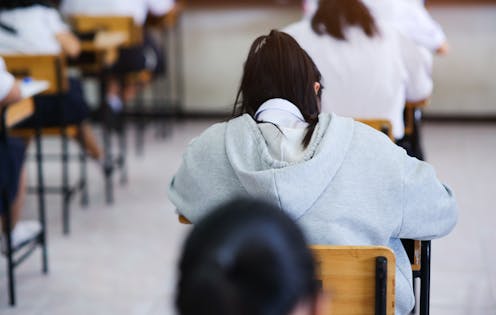Source: The Conversation (Au and NZ) – By Jill Colton, Program Director: Secondary Programs and Senior Lecturer: English and Literacy Education, University of South Australia
Many Year 12 students are preparing for final exams throughout October and November.
What happens if something unexpected happens that makes final preparations or performance on the day more difficult?
This is where special consideration or special provisions can help.
How might you be eligible?
Students who experience something unexpected during the exam period may be eligible for special consideration. This can minimise the impact on a student’s overall marks.
To be eligible, incidents must be beyond the student’s control. For example, a serious illness, an accident, a family crisis or an interruption during the exam. It does not include family holidays, a teacher being away or mixing up exam dates.
A student suffering a flare up of pain and fatigue because of glandular fever is likely to be eligible as long as they have a medical diagnosis and recent documentation such as a letter from their GP. Other unexpected illnesses might include gastro, flu or COVID.
Unexpected mishaps or misadventure such as your home being flooded or a sporting accident that puts you into hospital can prevent you from participating in your exam. In cases like these you will need to provide evidence.
A death of a close relative can also mean a student is considered eligible for special arrangements. Other family crises may also be included depending on the circumstances and how they affect you. It’s best to consult with your school to find out if you might be eligible.
Students with disabilities and chronic illnesses can also apply for special consideration. This is something that must be organised earlier in the year through your school and helps teachers make adjustments that enable students to participate equitably.
There are also a range of entry processes for university and other post-school training and education pathways. Check with the institution you are interested in for more information.

JJ-stockstudio/Shutterstock
What do you need to do to apply?
The process of applying for special consideration for exams differs slightly depending which state or territory you live in. However, the same principles apply:
-
you will need documentary evidence – such as letters from your doctor, police reports, statutory declarations or a death certificate
-
it must be clear how the unexpected situation impacts your performance, such as being too sick to study or too unwell to attend the exam.
Your school will then manage the process on your behalf and where relevant, submit the application to the local exam board.
Make sure you let your school know as soon as possible if you think something has happened that will have an impact on your exams.
What happens next?
Special consideration aims to ensure a student’s final result is an accurate reflection of their expected achievement. Depending on what has happened, and when it happened, a student may be able to have:
-
additional reading or writing time
-
do their exam in another room
-
extensions to due dates
-
rest breaks, or
-
time to attend to medical needs without loss of test or exam time.
If a student can’t do their exam or their participation was significantly impaired, a moderated school result or predicted mark will be used. This is a result based on performance during the year.
This might happen in situations where a whole class is affected. For example, a fire alarm went off half way through an exam.
Unexpected things happen to all of us at some stage in our lives. If something goes wrong in your life around exam time, talk to your school and gather your documentation. And be informed about how you can be supported to be graded fairly.
For more state-specific information, you can go to your state’s exam board:
-
South Australia and Northern Territory (SACE)
-
Queensland (QCAA)
-
New South Wales (HSC)
-
Tasmania (TASC)
-
Western Australia (WACE)
-
Victoria (VCE)
-
Australian Capital Territory (BSSS).
![]()
Jill Colton does not work for, consult, own shares in or receive funding from any company or organisation that would benefit from this article, and has disclosed no relevant affiliations beyond their academic appointment.
– ref. What is special consideration for exams? How does it work? – https://theconversation.com/what-is-special-consideration-for-exams-how-does-it-work-240441





